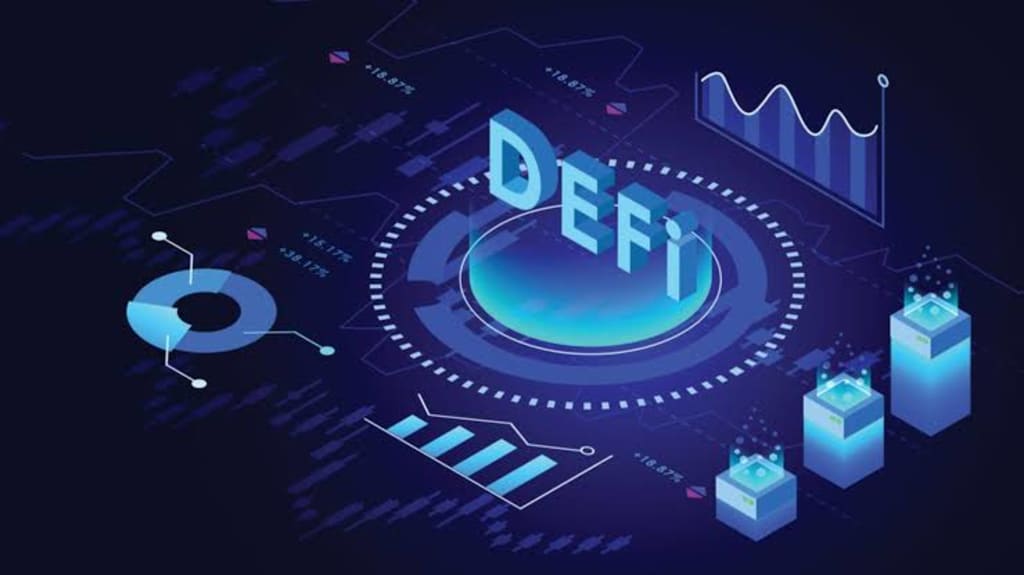THE FUTURE OF DECENTRALIZED FINANCE (Defi)
Revolutionizing the Financial Landscape through Blockchain Technology

Decentralized finance (DeFi) refers to a new financial ecosystem that operates on blockchain technology, without the need for intermediaries such as banks or financial institutions. This new financial landscape has emerged in response to the limitations and inefficiencies of the traditional financial system, and has the potential to completely disrupt the way we think about and use money.
One of the key advantages of DeFi is that it operates on a decentralized, open-source platform that is accessible to anyone with an internet connection. ThDecentralized Finance, or DeFi, is revolutionizing the traditional financial system by introducing a new paradigm that is based on blockchain technology. This emerging trend is rapidly gaining popularity and is poised to change the way we think about finance, banking, and investment. DeFi enables individuals to bypass traditional financial institutions and intermediaries, providing access to a range of financial services in a secure, transparent, and decentralized manner. With the explosive growth of DeFi platforms and applications, the future of finance is set to be more inclusive, efficient, and accessible than ever before. In this era of digital transformation, let's delve deeper into the fascinating world of DeFi and explore what the future holds for this groundbreaking technology. This means that anyone, anywhere in the world, can access financial services that were previously only available to a privileged few. Furthermore, DeFi operates on the principles of transparency and fairness, as all transactions are recorded on a public ledger and cannot be altered or manipulated.
The DeFi ecosystem currently consists of a range of financial services and products, including decentralized exchanges (DEXs), stablecoins, decentralized lending platforms, and yield farming platforms. These services allow users to trade, lend, borrow, and invest in a wide range of assets, including cryptocurrencies and traditional assets, without the need for intermediaries.
One of the most exciting aspects of DeFi is its potential to bring financial services to the unbanked and underbanked populations of the world. According to the World Bank, there are 1.7 billion adults who do not have access to formal banking services, and DeFi has the potential to provide these people with financial services for the first time. Additionally, DeFi has the potential to provide financial services to people in countries with weak or unstable currencies, as it operates on a global, decentralized platform that is not susceptible to local economic conditions.
DeFi also has the potential to completely disrupt the traditional banking system by offering lower fees, faster transaction times, and more transparent and secure financial services. For example, decentralized exchanges (DEXs) offer a more cost-effective and efficient alternative to centralized exchanges, as they do not charge high fees or require users to go through a lengthy KYC process. Additionally, DeFi platforms are not subject to the same regulatory restrictions as traditional financial institutions, which means that they can offer financial services in a more flexible and innovative way.
Despite the many benefits of DeFi, there are also significant risks and challenges that need to be addressed. One of the biggest concerns is security, as the decentralized nature of DeFi means that users are responsible for their own funds, and there is no central authority to provide protection against theft or fraud. Additionally, DeFi platforms are still in their early stages of development and are subject to rapid changes and updates, which can result in bugs and vulnerabilities that can be exploited by hackers.
Another challenge facing DeFi is scalability, as the current infrastructure is not yet able to handle the volume of transactions required for widespread adoption. Furthermore, the regulatory landscape for DeFi is still uncertain, and there is a risk that governments and regulators may attempt to restrict or ban the use of DeFi platforms.
In conclusion, the future of DeFi is incredibly exciting, as it has the potential to completely transform the way we think about and use money. However, there are also significant risks and challenges that need to be addressed, including security, scalability, and regulation. Nevertheless, the potential benefits of DeFi are too significant to ignore, and it is likely that we will see significant growth and adoption in this space over the next few years.






Comments
There are no comments for this story
Be the first to respond and start the conversation.